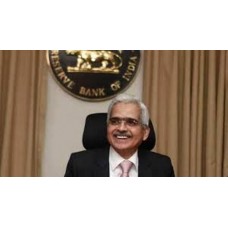Policy repo rate reduced to 4% from 4.40%
In a monetary policy statement, 2020-21, RBI resolution of the Monetary Policy Committee (MPC) said on the basis of an assessment of the current and evolving macroeconomic situation, the MPC at its meeting decided to:
1: Reduce the policy repo rate under the liquidity adjustment facility (LAF) by 40 bps to 4.0 per cent from 4.40 per cent with immediate effect.
2: Accordingly, the marginal standing facility (MSF) rate and the Bank Rate stand reduced to 4.25 per cent from 4.65 per cent; and the reverse repo rate under the LAF stands reduced to 3.35 per cent from 3.75 per cent. 3: The MPC also decided to continue with the accommodative stance as long as it is necessary to revive growth and mitigate the impact of COVID-19 on the economy, while ensuring that inflation remains within the target.
These decisions are in consonance with the objective of achieving the medium-term target for consumer price index (CPI) inflation of 4 per cent within a band of +/- 2 per cent, while supporting growth. The main considerations underlying the decision are set out in the statement.
The inflation outlook is highly uncertain. As supply lines get restored in the coming months with gradual relaxations in the lockdown, the unusual spike in food inflation in April is expected to moderate. The forecast of a normal monsoon also portends well for food inflation.
Given the current global demand-supply balance, international crude oil prices are likely to remain low although they may firm up from the recent depressed levels. Soft global prices of metals and other industrial raw materials are likely to keep input costs low for domestic firms.
Deficient demand may hold down pressures on core inflation (excluding food and fuel), although persisting supply dislocations impart uncertainty to the near term outlook. However, volatility in financial markets could have a bearing on inflation. These factors, combined with favourable base effects, are expected to take effect and pull down headline inflation below target in Q3 and Q4 of 2020-21.
Turning to the growth outlook, economic activity other than agriculture is likely to remain depressed in Q1:2020-21 in view of the extended lockdown. Even though the lockdown may be lifted by end-May with some restrictions, economic activity even in Q2 may remain subdued due to social distancing measures and the temporary shortage of labour. Recovery in economic activity is expected to begin in Q3 and gain momentum in Q4 as supply lines are gradually restored to normalcy and demand gradually revives.
For the year as a whole, there is still heightened uncertainty about the duration of the pandemic and how long social distancing measures are likely to remain in place and consequently, downside risks to domestic growth remain significant. On the other hand, upside impulses could be unleashed if the pandemic is contained, and social distancing measures are phased out faster.
The MPC is of the view that the macroeconomic impact of the pandemic is turning out to be more severe than initially anticipated, and various sectors of the economy are experiencing acute stress. The impact of the shock has been compounded by the interaction of supply disruptions and demand compression. Beyond the destruction of economic and financial activity, livelihood and health are severely affected.
Even as various measures initiated by the Government and the Reserve Bank work to mitigate the adverse impact of the pandemic on the economy, it is necessary to ease financial conditions further. This will facilitate the flow of funds at affordable rates and revive animal spirits.
With the inflation outlook remaining benign as lockdown-related supply disruptions are mended, the policy space to address growth concerns needs to be used now rather than later to support the economy, even while maintaining headroom to back up the revival of activity when it takes hold.
Accordingly, all members voted for a reduction in the policy repo rate and maintaining the accommodative stance as long as it is necessary to revive growth and mitigate the impact of Covid-19 on the economy, while ensuring that inflation remains within the target.
Dr. Pami Dua, Dr. Ravindra H. Dholakia, Dr. Janak Raj, Dr. Michael Debabrata Patra and Shri Shaktikanta Das voted for a reduction in the policy repo rate by 40 bps, while Dr. Chetan Ghate voted for a reduction by 25 bps.




